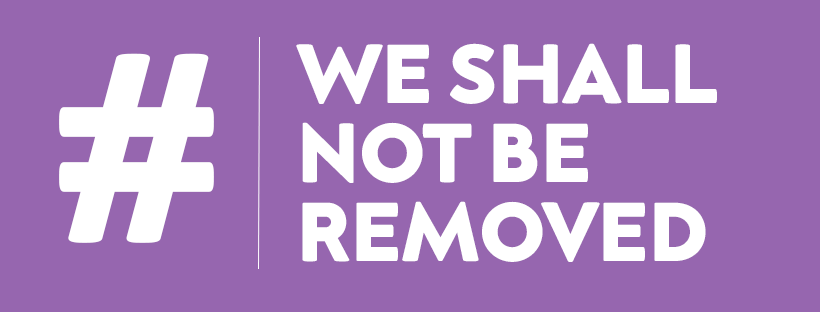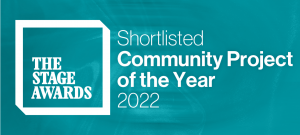Former Government Disability Champion Andrew Miller MBE talks about the ‘#WeShallNotBeRemoved’ Campaign Shortlisted for the ‘Community Project of the Year’ at the 2022 The Stage Awards

Born out of unpredictably of the pandemic last year, the #WeShallNotBeRemoved campaign, co-founded by former government disability champion Andrew Miller MBE and celebrated Artistic Director of Graeae Theatre Company Jenny Sealey MBE have tirelessly campaigned for a more inclusive arts sector moving forward. Their efforts so far having witnessed them secure over £150,000 in additional funding for disabled artist, ensuring that inclusivity was included in public statements around the reopening of theatres and serving as a support system for the deaf, disabled, learning disabled and neurodiverse community. The initiative has been recognised for the inspirational work achieved so far, having made the shortlist for ‘Community Project of the Year’ at the prestigious 2022 The Stage Awards. Andrew tells us more about the initiative’s aims and hopes!
Hi Andrew, The UK Disability Arts Alliance’s #WeShallNotBeRemoved campaign has been shortlisted for the ‘Community Project of the Year’ at the 2022 The Stage Awards. How are you all feeling?
We could not be more proud that our work providing a platform for creative disabled people during the pandemic has been recognised by The Stage Awards. The nomination is very timely and important for us as once again Covid has denied many disabled and chronically ill people their visibility. It’s also raised our spirits – especially to be placed amongst such distinguished company as our fellow nominees – all incredible projects.
#WeShallNotBeRemoved was set up during the pandemic by Jenny Sealey MBE – Artistic Director of Graeae and yourself. The initial response witnessing 700+ deaf, disabled, learning disabled and neurodiverse people join the campaign with members representing every role and capacity in the creative industries. How did you both approach setting up the initiative?
Jenny and I both felt a strong and unified voice was needed to ensure creative disabled people were not forgotten about as shielding meant many of us became invisible overnight. In April 2020 Jenny brought me together with musician John Kelly and stage director Nickie Wildin to record a Zoom podcast on the unfolding crisis and at that meeting our campaign was formed. #WeShallNotBeRemoved was both a challenge and a provocation to the sector as well as for us, a simple declaration of intent.
The campaign lobbied to ensure that inclusivity was included in public statements around reopening theatres and secured more than £150,000 in additional funding for disabled artists, inspiring spin-off campaigns and revealed the marginalisation of disabled arts professionals through a major survey. In terms of what the initiative has achieved so far, what has this meant for community morale?
Many disabled people felt badly overlooked throughout the pandemic. There was deep anger that we were written out of the national Covid narrative and reduced to somehow ‘expected’ death statistics as a consequence of being “clinically extremely vulnerable” or having “underlying health conditions”. The success of #WeShallNotBeRemoved in achieving visibility provided hope for many that even in such trying conditions disabled people could still be a powerful and creative force for change.
The campaign have also created a seven principle guidance (published in 2020) to ensure an inclusive recovery, the principles being – Recognising the Supremacy of the Equality Act, Understanding the Social Model of Disability, Consulting with Disabled People to inform your decision making, providing clear and comprehensive information, Mapping the Customer Journey, Supporting Disabled Artists and protecting the Disabled workforce. The guidance was created in partnership with Ramps on the Moon, Attitude is Everything, Paraorchestra, and What Next? How did you all work together to realise the guidance?
It became clear in the summer of 2020 that despite our lobbying, official Government Guidance for the reopening of the cultural sector was not going to focus much on the specific needs of disabled artists, employees or audiences. So I decided we should do our own and with a small group of colleagues we set to work to provide the sector with a practical, user-friendly guide to promote an inclusive cultural recovery. And through a rigorous intersectional process of consultation the Seven Principles emerged. In retrospect I am especially pleased that we placed such a focus on ableism, which until then was not broadly recognised in the creative industries. All my co-authors are of course delighted that the Principles have had such a lasting impact on the arts sector and were even finally endorsed by the UK Government!
What are your hopes for the campaign moving forward?
We want to be made redundant! We recognise the work of advocating for creative disabled people through this pandemic is not yet over and we will continue to campaign and make noise until it is. I guess the legacy of #WeShallNotBeRemoved will be found in the reignited activism of our community. We have demonstrated huge impact on cultural policy and in bringing the concept of ableism to the fore in the arts. So I hope there is now heightened recognition of the need for inclusion, of the need to engage with anti-ableist practice, of the resilience of disabled artists but also the fragility of our place in the arts ecosystem.

Questions by Lucy Basaba.
To find out more about the #WeWillNotBeRemoved campaign, visit here…
The Stage Awards 2022 will take place on Monday 31st January 2022. To find out more about the event, visit here…


Leave a Comment